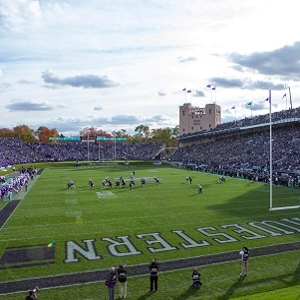Q and A: What’s the Capstone Like for the Master of Arts in Sports Administration?

In order to graduate from the Master of Arts in Sports Administration (MSA) program, students must complete either a capstone class or thesis project. Recently, SPS spoke with two students in the MSA program who are nearing graduation, Kayla Zenner and Bobby Baehr, both of whom have decided on the capstone option.
Now that you’re nearing the end, what do you think of the MSA program overall? How was the coursework? How was the faculty? What skills did you learn that will carry over into your career?
Kayla Zenner: I loved the MSA program. The program gave me tremendous opportunities to network with others in the sports industry and do hands-on projects for sports organizations so I could apply everything I was learning. The coursework was manageable and interesting. I found that most of my coursework was something I could apply to my job.
The faculty was also great – they’re all so willing to help you further your career. The program gave me great insight into the business aspects of the sports industry. My undergraduate degree is in sociology so the business background was not something I had. Learning finance and marketing skills has really helped me to make more informed decisions at my job. The opportunity to be able to work hands-on with sports organizations in my classes has furthered my understanding of how to market a sports team with innovative and creative ideas.
Bobby Baehr: I agree. I’ve thoroughly enjoyed the MSA program as well. I took one class per quarter, which enabled me to get the most out of every class. The coursework varied, so in some classes my social life was shot for 10 weeks (like right now.)
The faculty in the MSA program were phenomenal. It just makes sense to have faculty that are currently working in sports.
What factored into your decision to complete the capstone rather than a thesis?
Kayla Zenner: I decided to do a capstone because I really enjoy the in-class setting and being able to discuss everything with my peers. I also enjoy having the structure and guidance from a professor each week in class.
Bobby Baehr: The big kicker for taking the capstone as opposed to the thesis was timing. I really was ready to finish up. I have been plugging away for about 2.5 years.
What are you doing for your capstone project?
Kayla Zenner: My capstone is creating a sports organization. I’m a big fan of baseball and spent some time working for a summer collegiate baseball team, the Kenosha Kingfish, in the Northwoods League. Because of this I decided to create a new Northwoods League team in Illinois for my capstone.
Bobby Baehr: For my capstone project, I am hosting a college basketball double header that copies elements from the Legends Classic, Carrier Classic, and Crossroads Classic. The event will be called the Grand Chicago Classic. The GCC features four local teams: Northwestern, DePaul, Loyola and Chicago State, in a double header in the Grand Ball Room at Navy Pier.
What logistics go into your capstone?
Kayla Zenner: The capstone involves market research for my sports organization to find the correct location for the team and the right target audience. I also looked at the history of similar sports organizations in order to understand the social context of that sport and what draws people to it. I created a projected revenue and expense report for the team as well as a strategic marketing plan and organizational structure. Anything that goes into creating a sports organization, I had to do! The capstone is as if I was actually creating this organization and had to do all the research for it.
Bobby Baehr: A great deal of research and asking questions. This capstone is fun because I actually have to apply everything I’ve learned in the MSA program. When it comes to applying the themes, it can be difficult, but professors are very willing to work with you when you have questions.
Have you encountered any hurdles in your capstone?
Kayla Zenner: The capstone is hard work – you apply everything you have learned in the MSA program. You perform a lot of your own research each week. It does take time, but if you find something you are passionate about for your capstone topic, it’s definitely enjoyable!
Bobby Baehr: Some, but like any hurdle you have to overcome it and find a solution.
How does your capstone fit into your plans after graduation?
Kayla Zenner: After graduation, I am starting a new job as the Marketing & Corporate Service Coordinator for the Wisconsin Woodchucks, a summer collegiate baseball team in the Northwoods League. As I am working on my capstone and creating a strategic marketing plan for a new Northwoods League team, I’m also thinking of ways I can implement these ideas with the Woodchucks. I look forward to actually making my capstone ideas a reality at my job! I also hope to work my way up in the League and someday be a General Manager of a team. Having the business background from the MSA program will help me to pursue that career.
Bobby Baehr: I believe the Grand Chicago Classic is an event that could actually take place. I hope to one day become a Division I Athletics Director, therefore I may be planning or having one of my teams in an event like this in the future. The capstone really ties everything together from the entire program in a very practical way.
